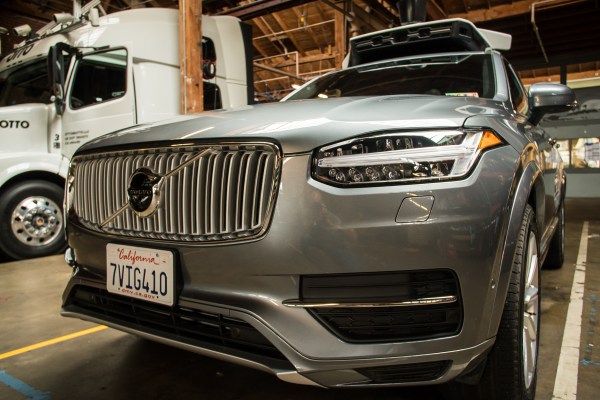Uber launched a small fleet of self-driving vehicles in San Francisco on Tuesday, but the second city to host the public test of the ride-hailing company’s work in this area isn’t quite as enthusiastic on the regulator side. California’s DMV, which has a practice of vetting companies testing autonomous driving technology on state roads and then granting permits to those who meet its standards.
Twenty such companies are on the DMV’s list of parties approved for autonomous testing in the state, but Uber is not on that list – the DMV says it should be, but Uber maintains it doesn’t need to seek a permit because of the circumstances of its self-driving launch.
The DMV’s statement on the matter notes that while it “encourages the responsible exploration of self-driving cars,” it’s not enough to simply assume responsible action on the part of companies doing testing:
We have a permitting process in place to ensure public safety as this technology is being tested. Twenty manufacturers have already obtained permits to test hundreds of cars on California roads. Uber shall do the same.
Uber, for its part, maintains that it actually doesn’t require one of these special DMV permits in California because of the nature of its testing. That’s because it sees the vehicles as still primarily human-controlled, since a driver behind the wheel with their hands at the steering wheel ready to take control is still required at this phase of testing.
Uber confirmed to TechCrunch that it will not be pursuing a DMV permit at this time, and highlighted the following official comments taken from a blog post by Anthony Levandowski, head of its Advanced Technology Group:
Finally, we understand that there is a debate over whether or not we need a testing permit to launch self-driving Ubers in San Francisco. We have looked at this issue carefully and we don’t believe we do. Before you roll your eyes and think, “there they go again” let us take a moment to explain:
First, we are not planning to operate any differently than in Pittsburgh, where our pilot has been running successfully for several months. Second, the rules apply to cars that can drive without someone controlling or monitoring them. For us, it’s still early days and our cars are not yet ready to drive without a person monitoring them.
But there is a more fundamental point—how and when companies should be able to engineer and operate self-driving technology. We have seen different approaches to this question. Most states see the potential benefits, especially when it comes to road safety. And several cities and states have recognized that complex rules and requirements could have the unintended consequence of slowing innovation. Pittsburgh, Arizona, Nevada and Florida in particular have been leaders in this way, and by doing so have made clear that they are pro technology. Our hope is that California, our home state and a leader in much of the world’s dynamism, will take a similar view.
Uber is no stranger to disagreeing with local regulators in the course of its operations, and it has largely been successful in the U.S. and abroad in negotiating around rules where necessary. Whether that will be the case in this instance, too, remains to be seen.
